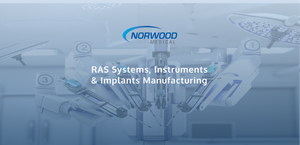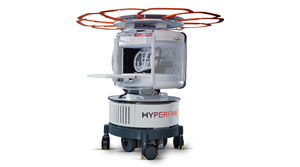Medical Device & Diagnostic Industry MagazineMDDI Article Index Originally Published MDDI July 2005R&D DIGEST
July 1, 2005
Medical Device & Diagnostic Industry Magazine
MDDI Article Index
Originally Published MDDI July 2005
R&D DIGEST
|
Assistant professor Michelle LaPlaca, with the help of Bryan Williams, demonstrates DETECT's ability to identify mild concussions in almost any setting. |
A device that identifies an athlete's concussion on the sidelines may also be able to evaluate cognitive decline linked to Alzheimer's disease.
The device is named DETECT (Display Enhanced Testing for Concussions and mTBI system). It was originally intended for use during a football game. The portable device performs a test for mild traumatic brain injury (mTBI) in minutes. Many mTBI tests often take a long time and can't be performed on a field.
The portable computer, equipped with headgear and software, is the first of its kind for sideline assessment of concussion that relies on an immersive environment, says coinventor Michelle LaPlaca. She is an assistant professor of biomedical engineering at the Georgia Institute of Technology and Emory University (both Atlanta).
DETECT is now being tested for detecting early cognitive decline, a possible indication of Alzheimer's disease, in the elderly. Initial results have been encouraging, says David Wright, MD, assistant director of Emory's Emergency Medicine Research Center.
Several other applications within the realm of head injury are possible. “Essentially, it could be used for anything that causes cognitive impairment,” says Wright. “We're running a study to detect concussions in a busy, noisy emergency room.”
Physicians may be able to use the device in their offices as an initial screening technique, says LaPlaca. After performing the neuropsychological test, doctors could refer the patient to an outside site, if necessary. The device is also being tested for use in emergency and military settings.
“We've taken the best of the neuropsychological tests that are sensitive to picking up head injury,” says Wright. “Then we computerized and reduced them to a very concentrated matter.” It takes about 5 minutes to conduct the tests, which are unaffected by nearby noise and movement.
The system consists of a helmet that goes over the head and is similar to a virtual reality gaming system. To use the device, the patient performs a series of cognitive tasks using a large handheld controller with two buttons. Eye goggles have a foam lip to block ambient light. A headphone system reduces white noise to make the directions audible without distraction. Impairment is determined based on the answers and response times measured by the device.
The working prototype is currently hardwired to a small laptop. LaPlaca and Wright plan to explore the use of wireless technology and reducing the size of the computer that collects and analyzes the data. The software also needs to be validated and made more user-friendly.
“The obvious problem has been that there's no good way to assess concussions on the sidelines. Everyone in the sports industry will tell you that they're concerned about sending athletes who could be at risk for further injury back into the game,” explains Wright. Anyone who suffers a concussion and returns to athletics too soon is prone to further concussions and risk of serious brain injury.
The Walter H. Coulter Foundation (Miami) helped to fund the project.
Copyright ©2005 Medical Device & Diagnostic Industry
About the Author(s)
You May Also Like



